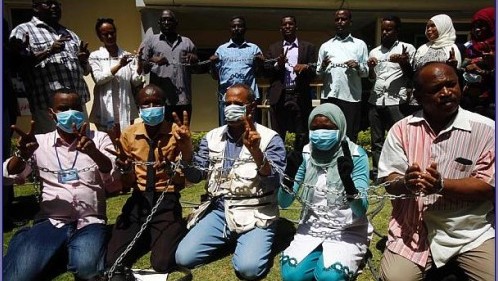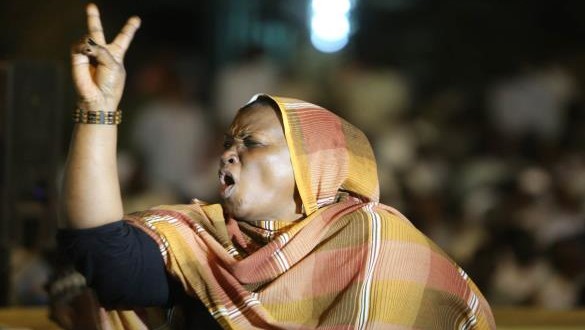After a week of sleeping in the reception area of the State Security Prosecution Office in Khartoum, Arwa Al-Rabie was released on Monday night on bail just in time to see her daughter.
The teenager had come to Sudan hoping to support her family during the ordeal of her mother’s detainment and possible prosecution.
The ordeal is far from over.
On May 30 the State Security Prosecutor submitted the case brought against Arwa and seven employees of the Centre for Training and Human Development (TRACKS Center) to a criminal court in Khartoum as confirmed by their lawyer in news reports. The center’s workers will have to fight a legal battle against charges that could mean the death penalty or life imprisonment.
Security-owned Akhir Lahza newspaper reported that TRACKS employees will face charges from the 1991 Criminal Law that include undermining the constitutional system (article 50), waging war against the state (article 51), and forging documents (article 123). If charged with articles 50 and 51, they face the death penalty. When the article was published, neither the lawyer nor the accused had an idea about the charges they could be facing.
Their battle will now begin in court, but their ordeal dates back to February 29 when security agents from the National Intelligence and Security Services (NISS) raided the Amarat-based TRACKS in a manner described as “degrading” by a source.
“They barged into the center in an aggressive manner, they hit one of the employees with a newspaper in a way that is meant to humiliate, and they continued to provoke us,” said Al-Baqir Al-Afif, the director of the Al-Khatim Adlan Center for Enlightenment and Human Development (KACE), which was shut down by NISS in 2012. Al-Afif was visiting TRACKS at the time of the raid.
Laptops and even personal belongings such as mobile phones and cars were confiscated and for the next two weeks, the employees suffered from daily interrogations. They were forced to report to the NISS premises in the early morning only to be interrogated at 7pm, forcing them to sit for long hours facing the wall in extreme heat conditions. Al-Rabie reported to NISS for most of March and had her passport confiscated then.
A lawyer by profession, Al-Rabie is a musician who, among other cultural projects, is known for documenting the work and lives of women musicians and artists in Sudan. She worked at the now-shut down Al-Khatim Adlan Center for Enlightenment and Human Development (KACE) before moving to TRACKS in 2013 to work as an administrative director.
For those who know her, Al-Rabie is a fighter. In the last four years, she witnessed NISS raid her office several times, first at KACE, then at TRACKs. Like other civil society actors, security agents have summoned her to their premises for long periods of interrogation. She was intimidated and threatened. Her phone has been bugged for long periods of time. All of this did not deter Al-Rabie from continuing to fight for human and cultural rights in Sudan.
TRACKS came to life in 2013 and was founded by a number of trainers in human rights, information technology as well as foreign languages. The center had refugees from now defunct (by order of security) civil society organizations among its employees, but was primarily a training center.
In March 2015, the center suffered a raid by the NISS. Laptops and other equipment were confiscated from staff members and Khalaf-Allah Al-Afif, the center’s director, and Adil Bakheit, a trainer who was doing a workshop at the time, were arrested and faced classified crimes against the state that carry the death penalty.
“Just days before the raid, the prosecutor called the center’s director and said that he can come and collect their belongings as they have found no evidence to take this case forward,” Al-Afif said. “NISS was not pleased and took their revenge not on the prosecution office, but on TRACKS center.”
He added that for 11 months the prosecution office failed to find evidence on all the desktops and laptops collected from the center.
There was surely a silence before the storm. For two months, the calls and the summoning for interrogation stopped, then the phone calls to the director started. The first call summoned him to court and the second phone call told him that seven employees affiliated with the center and a visitor who was there at the time are summoned for questioning at the State Security Prosecution Office.
“For one week, they were punished: They just left them without interrogation or anything, [so] they had no idea what is happening,” said Al-Afif, whose brother Khalf-Allah remains detained inside the prosecution office.
The family members remain as confused as the detainees. The two women detainees, Al-Rabie and Iman Leila, were released late on May 30, but others remain in limbo inside the prosecution office. A relative of one of the detainees told Nuba Reports that his family told his father that his son travelled as they are worried about his father’s health.
“I am worried about my colleagues,” Al-Rabie told Nuba Reports after her release. “They are in a 4-by-4-meter room that is used to hold 22 people. They cannot even lie down to sleep and have to stay in their underwear due to extreme heat. There is no respect for human dignity.”
For a week, Al-Rabie slept on an aluminum sofa and had access to a shower after 1 a.m. when the water was finally on.
Ongoing Crackdown
Civil society organizations in Sudan have faced a strong crackdown since 2009 when the ICC indicted President Bashir and, as a result, several national and international organizations were closed.
Since then, a number of organizations were shut down indefinitely, had their licenses revoked or faced intimidation by the security apparatus and its organ that is responsible for regulating the work of organizations, the Humanitarian Aid Commission (HAC). Last year NISS raided the Sudanese Human Rights Monitor, one of the oldest NGOs in Sudan, while in 2014, the Ministry of Justice shut down Salmmah Women’s Resource Center after more than 17 years in operation.
Mohamed Badawi, who worked at the Khartoum Center for Human Rights and Environmental Degradation, told Nuba Reports that “what is happening now is an extension to the closure of space for civil society groups in Sudan, especially those working on human rights.” He said the crackdown is on freedom of expression, freedom of movement and freedom of assembly.
This year, several newspapers’ print runs have been confiscated and journalists face prosecution from several state institutions including NISS. Civil society actors have been stopped at the Khartoum airport, had their passports confiscated and denied the opportunity to travel to attend conferences, meetings and workshops abroad.
The Khartoum Center was shut down by the NISS in 2009, its employees faced detention, ill-treatment and intimidation, however, the ongoing legal prosecution is an escalation.
“We should take note of the laws they choose to prosecute them with,” said Badawi, a lawyer by training who now works with the African Center for Justice and Peace Studies. They are vague so you don’t understand where this is leading you to. They send a strong message to the civil society to be fearful and the investigation is lengthy, making you stuck in an ordeal for a long time.
Civil society groups have vowed to fight this crackdown and stand strong with TRACKS.
“We will fight this through the court and through the media,” Al-Afif said.
The battle will not be easy. A report released by the Confederation of Sudanese Civil Society Organizations, a body covering all independent organizations, stated that the group received 28 reports from civil society between January and March 2016, most of which represented grave violations such as detention, closure and confiscation. This represents a 75 percent increase from the last quarterly report.
“Civil society is moving towards living in a big prison,” Badawi said.






